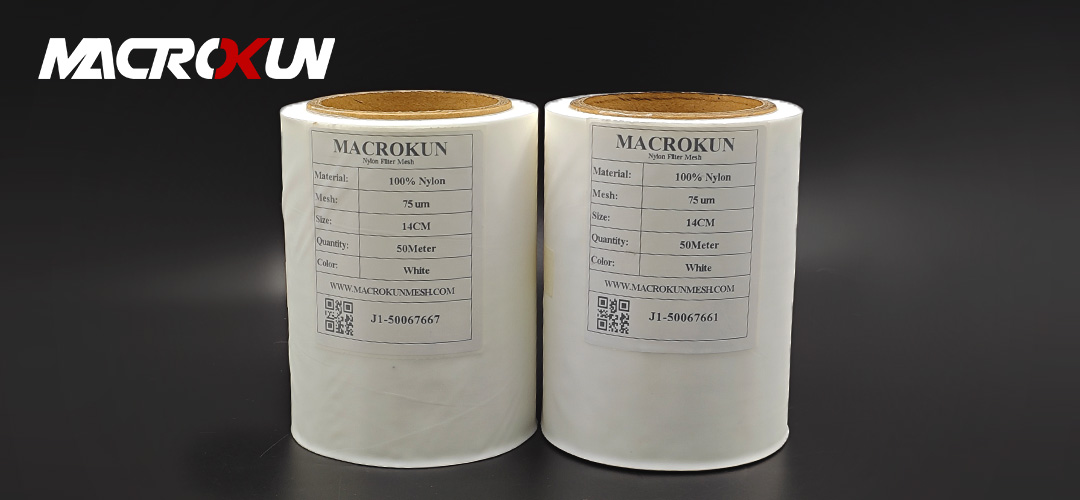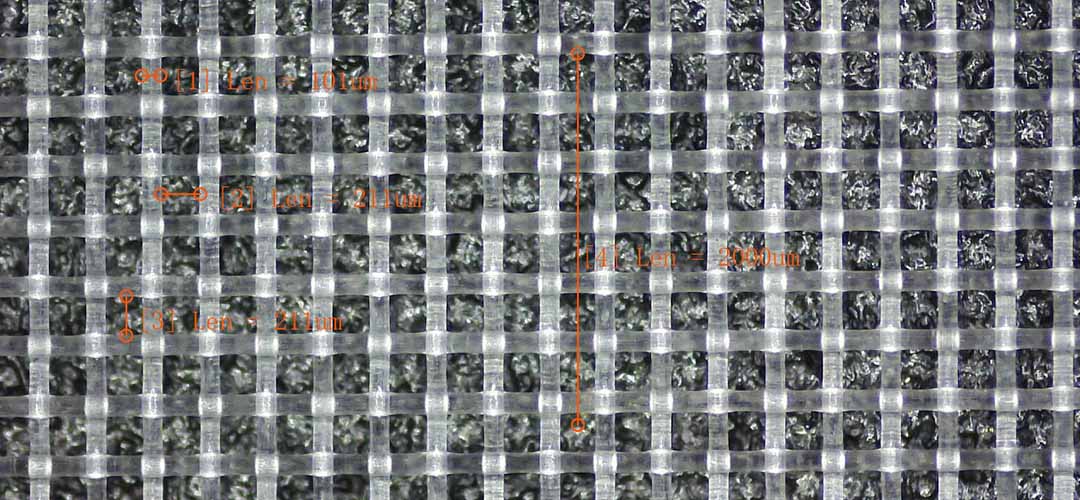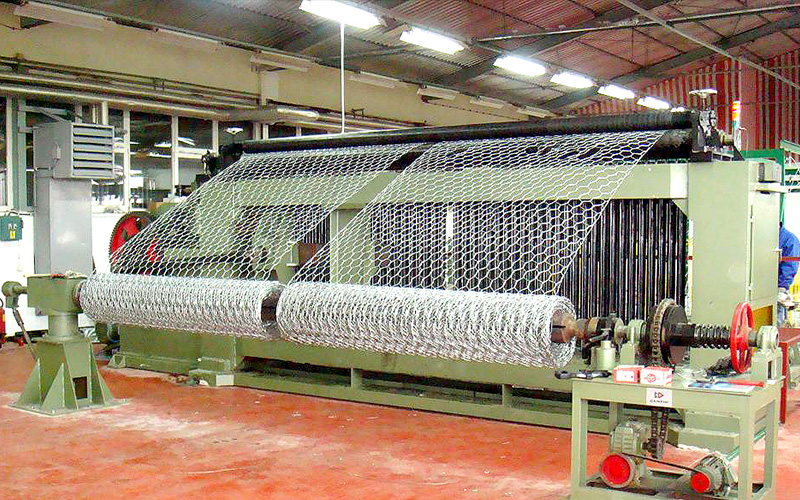Nylon mesh is a versatile material that is commonly used in food processing for filtration purposes. Its fine mesh structure allows for the removal of impurities and contaminants from food products, ensuring that the final product is of high quality and purity. There are several benefits to using nylon mesh for food filtration, making it an essential tool in the food processing industry.

One of the primary benefits of using nylon mesh for food filtration is its durability. Nylon is a strong and resilient material that can withstand the rigors of food processing without breaking or tearing. This durability ensures that the mesh will not degrade over time, allowing for consistent and reliable filtration of food products.
In addition to its durability, nylon mesh is also highly resistant to chemicals and corrosion. This makes it an ideal material for use in food processing, where exposure to various chemicals and cleaning agents is common. Nylon mesh will not react with these substances, ensuring that the filtration process remains effective and efficient.
Another benefit of using nylon mesh for food filtration is its flexibility. Nylon mesh can be easily molded and shaped to fit a variety of filtration systems, making it a versatile option for food processing facilities. This flexibility allows for customization of the filtration process to meet the specific needs of different food products, ensuring that each product is filtered effectively and efficiently.
Furthermore, nylon mesh is easy to clean and maintain, making it a cost-effective option for food processing facilities. Regular cleaning and maintenance of the mesh will ensure that it remains in optimal condition, providing consistent filtration results for an extended period of time. This ease of maintenance reduces downtime and increases productivity in food processing operations.

Additionally, nylon mesh is a hygienic option for food filtration. Its smooth surface prevents the buildup of bacteria and other contaminants, ensuring that the filtration process does not introduce any additional impurities into the food products. This helps to maintain the quality and purity of the final product, meeting the strict hygiene standards required in the food processing industry.
Overall, the benefits of using nylon mesh for food filtration are clear. Its durability, resistance to chemicals, flexibility, ease of maintenance, and hygienic properties make it an essential tool for ensuring quality and purity in food processing. By incorporating nylon mesh into their filtration systems, food processing facilities can improve the efficiency and effectiveness of their operations, producing high-quality products that meet the highest standards of safety and purity.
Nylon mesh is a versatile material that is commonly used in food processing for filtration purposes. Its fine mesh structure allows for the separation of solids from liquids, ensuring that only the purest form of the food product is obtained. This article will explore how nylon mesh plays a crucial role in ensuring quality and purity in food processing.
One of the key benefits of using nylon mesh in food processing is its ability to effectively filter out impurities. The fine mesh size of nylon allows for the removal of even the smallest particles, such as sediment, dirt, and debris, from the food product. This ensures that the final product is free from any contaminants that could compromise its quality and safety.
In addition to its filtration capabilities, nylon mesh is also highly durable and resistant to wear and tear. This makes it an ideal material for use in food processing, where equipment is subjected to frequent use and cleaning. Nylon mesh can withstand high temperatures and harsh cleaning chemicals without losing its effectiveness, ensuring that it can be used repeatedly without compromising its filtration capabilities.
Furthermore, nylon mesh is non-reactive and inert, meaning that it does not interact with the food product in any way. This is important in food processing, where maintaining the purity and integrity of the product is paramount. Nylon mesh will not leach any harmful chemicals or substances into the food, ensuring that the final product is safe for consumption.

Another advantage of using nylon mesh in food processing is its versatility. Nylon mesh can be customized to meet the specific filtration requirements of different food products. Whether a coarser or finer mesh size is needed, nylon mesh can be tailored to suit the needs of the food processing operation. This flexibility allows for greater control over the filtration process, ensuring that the desired level of purity is achieved.
Nylon mesh is also easy to clean and maintain, making it a practical choice for food processing facilities. Its smooth surface allows for quick and efficient cleaning, reducing the risk of bacterial growth and contamination. Regular cleaning and maintenance of nylon mesh filters can help prolong their lifespan and ensure consistent filtration performance.
In conclusion, nylon mesh plays a crucial role in ensuring quality and purity in food processing. Its fine mesh structure, durability, non-reactivity, versatility, and ease of maintenance make it an ideal material for use in filtration applications. By using nylon mesh filters, food processing facilities can effectively remove impurities from food products, ensuring that only the highest quality and purest form of the product reaches consumers.
Nylon mesh is a popular choice for food filtration in the food processing industry due to its durability, flexibility, and ability to effectively filter out impurities. When it comes to choosing the right nylon mesh for food filtration, there are several factors to consider to ensure quality and purity in food processing.
One of the most important factors to consider when choosing nylon mesh for food filtration is the mesh size. The mesh size refers to the number of openings per inch in the mesh screen. The smaller the mesh size, the finer the filtration will be. It is important to choose a mesh size that is appropriate for the type of food being processed. For example, if you are filtering out large particles, a larger mesh size may be more suitable. On the other hand, if you are filtering out very fine particles, a smaller mesh size would be more effective.
Another important factor to consider when choosing nylon mesh for food filtration is the material of the mesh. Nylon mesh is known for its strength and durability, making it an ideal choice for food processing applications. However, it is important to ensure that the nylon mesh is food-grade and meets all safety and quality standards. Food-grade nylon mesh is designed to withstand high temperatures and is resistant to chemicals and abrasion, making it safe for use in food processing.
In addition to mesh size and material, it is also important to consider the weave of the nylon mesh. The weave of the mesh refers to how the strands of nylon are intertwined to create the mesh screen. There are different types of weaves, such as plain weave, twill weave, and Dutch weave, each offering different levels of filtration and flow rates. It is important to choose a weave that is suitable for the specific requirements of the food processing application.
When choosing nylon mesh for food filtration, it is also important to consider the micron rating of the mesh. The micron rating refers to the size of the particles that the mesh can filter out. A lower micron rating indicates a finer filtration, while a higher micron rating indicates a coarser filtration. It is important to choose a nylon mesh with the appropriate micron rating for the specific requirements of the food processing application to ensure effective filtration and purity.
In conclusion, choosing the right nylon mesh for food filtration is essential to ensuring quality and purity in food processing. By considering factors such as mesh size, material, weave, and micron rating, you can select a nylon mesh that meets the specific requirements of your food processing application. With the right nylon mesh in place, you can effectively filter out impurities and contaminants, ensuring that your food products meet the highest standards of quality and safety.
Pre: Micron Nylon Mesh Fabric: High-Quality Material for Precision Filtration
Next: Nylon Screen Filters: Efficient Solutions for Liquid and Air Filtration

MACROKUN has established long-term and stable cooperative relations with many transportation companies such as China Post, DHL, FEDEX, USPS, UPS, etc. Of course, MACROKUN can also provide air and sea transportation. The powerful logistics system enables all MACROKUN'S Printing Mesh, Filter Mesh and Filter Bags and so on to be easily and efficiently transported to any place. For quotes and inquiries, please email our sales team.





